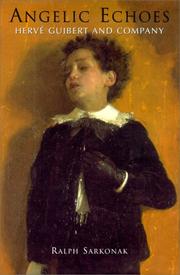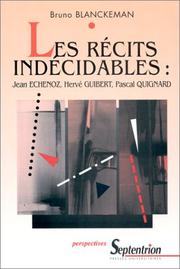| Listing 1 - 4 of 4 |
Sort by
|

ISBN: 9781442670853 1442670851 0802047947 9780802047946 9781487598754 1487598750 9781487598259 Year: 2000 Publisher: Toronto
Abstract | Keywords | Export | Availability | Bookmark
 Loading...
Loading...Choose an application
- Reference Manager
- EndNote
- RefWorks (Direct export to RefWorks)
In 1990 Hervé Guibert gained wide recognition and notoriety with the publication of "A l'ami qui ne m'a pas sauvé la vie (To the Friend Who Did Not Save My Life)". This novel, one of the most famous AIDS fictions in French or any language, recounts the battle of the first-person narrator not only with AIDS but also with the medical establishment on both sides of the Atlantic. Photography critic for Le Monde from 1977-1985, Guibert was also the co-author (with Patrice Chéreau) of a film script, L'Homme Blessé, which won a César in 1984, and author of more than twenty-five books, eight of which have been translated into English.In this vibrant and unusual study, Ralph Sarkonak examines many intriguing aspects of Guibert's life and production: the connection between his books and his photography, his complex relationship with Roland Barthes and with his friend and mentor Michel Foucault (relationships that were at once literary, intellectual, and personal in each case); the ties between his writing and that of his contemporaries, including Renaud Camus, France's most prolific gay writer; and his development of an AIDS aesthetic. Using close textual analysis, Sarkonak tracks the convolutions of Guibert's particular form of life-writing, in which fact and fiction are woven into a corpus that evolves from and revolves around his preoccupations, obsessions, and relationships, including his problematic relationship with his own body, both before and after his HIV-positive diagnosis.Guibert's work is a brilliant example of the emphasis on disclosure that marks recent queer writing-in contrast to the denial and cryptic allusion that characterized much of the work by gay writers of previous generations. Yet, as Sarkonak concludes, Guibert treats the notions of falsehood and truth with a postmodern hand: as overlapping constructs rather than mutually exclusive ones - or, to use Foucault's expression, as "games with truth."
Guibert, Hervé --- Criticism and interpretation. --- Friends and associates.

ISBN: 0802047947 1442670851 Year: 2000 Publisher: University of Toronto Press
Abstract | Keywords | Export | Availability | Bookmark
 Loading...
Loading...Choose an application
- Reference Manager
- EndNote
- RefWorks (Direct export to RefWorks)
In 1990 Hervé Guibert gained wide recognition and notoriety with the publication of "A l'ami qui ne m'a pas sauvé la vie (To the Friend Who Did Not Save My Life)". This novel, one of the most famous AIDS fictions in French or any language, recounts the battle of the first-person narrator not only with AIDS but also with the medical establishment on both sides of the Atlantic. Photography critic for Le Monde from 1977-1985, Guibert was also the co-author (with Patrice Chéreau) of a film script, L'Homme Blessé, which won a César in 1984, and author of more than twenty-five books, eight of which have been translated into English.In this vibrant and unusual study, Ralph Sarkonak examines many intriguing aspects of Guibert's life and production: the connection between his books and his photography, his complex relationship with Roland Barthes and with his friend and mentor Michel Foucault (relationships that were at once literary, intellectual, and personal in each case); the ties between his writing and that of his contemporaries, including Renaud Camus, France's most prolific gay writer; and his development of an AIDS aesthetic. Using close textual analysis, Sarkonak tracks the convolutions of Guibert's particular form of life-writing, in which fact and fiction are woven into a corpus that evolves from and revolves around his preoccupations, obsessions, and relationships, including his problematic relationship with his own body, both before and after his HIV-positive diagnosis.Guibert's work is a brilliant example of the emphasis on disclosure that marks recent queer writing-in contrast to the denial and cryptic allusion that characterized much of the work by gay writers of previous generations. Yet, as Sarkonak concludes, Guibert treats the notions of falsehood and truth with a postmodern hand: as overlapping constructs rather than mutually exclusive ones - or, to use Foucault's expression, as "games with truth."
Book
ISBN: 9780198159568 Year: 2000 Publisher: Oxford : Oxford Univ. Press,
Abstract | Keywords | Export | Availability | Bookmark
 Loading...
Loading...Choose an application
- Reference Manager
- EndNote
- RefWorks (Direct export to RefWorks)
Frans --- Roman français - 20e siècle - Histoire et critique --- Romans --- Französisch --- French fiction --- Roman. --- Französisch. --- History and criticism --- Ernaux, Annie --- Semprún, Jorge --- Pennac, Daniel --- Echenoz, Jean --- Guibert, Hervé --- Duras, Marguerite --- Geschichte 1900-2000 --- Geschichte 1981-1995 --- Geschichte 1984-1991

ISBN: 2859396136 9782859396138 Year: 2000 Volume: *2 Publisher: Villeneuve d'Ascq Presses Universitaires du Septentrion
Abstract | Keywords | Export | Availability | Bookmark
 Loading...
Loading...Choose an application
- Reference Manager
- EndNote
- RefWorks (Direct export to RefWorks)
Qu'en est-il de la littérature narrative française depuis les années 1980? Pour le savoir, cet essai étudie l'œuvre de trois écrivains, et leur projet respectif : l'investigation ironique des usages contemporains et des coutumes littéraires par Jean Echenoz ; la volonté propre à Hervé Guibert de se connaître, qui le conduisit à transgresser les contours convenus de l'autoportrait, à prospecter les envers de l'humain décor ; l'assimilation d'une érudition des plus éclectiques par Pascal Quignard, et son actualisation en fonction d'obsessions rémanentes. Représentatives, par leur distinction même, des différentes orientations littéraires en cours, ces trois œuvres permettent aussi de dégager quelques tendances esthétiques. Des formes classiques de fiction resurgissent, dans la parfaite mémoire des avant-gardes qui les ont tout au long du siècle contestées : simultanément les romans énoncent et dénoncent le romanesque. Un renouvellement des pratiques autobiographiques s'observe aussi, qui refuse toute approche constituée du Sujet et déstabilise l'idée d'identité autant qu'il aide à la constituer. Récits indécidables, pour ces raisons : à toute position formelle, thématique, sémantique dominante, ils préfèrent la posture contingente, mouvante, volontiers paradoxale. Cette nature ambiguë en fait par excellence des passeurs pour temps indécis. L'esthétique littéraire contemporaine, loin des frivolités qu'on lui reproche parfois, porte ainsi à la légère une réelle densité, culturelle et ontologique.
Comparative literature --- Guibert, Hervé --- Quignard, Pascal --- Echenoz, Jean --- French fiction --- History and criticism --- Criticism and interpretation --- 840-3 "19" --- Franse literatuur: proza--20e eeuw. Periode 1900-1999 --- 840-3 "19" Franse literatuur: proza--20e eeuw. Periode 1900-1999 --- Эшноз, Жан --- אשנוז, ז׳אן. --- Criticism and interpretation. --- 20th century --- French fiction - 20th century - History and criticism --- Echenoz, Jean - Criticism and interpretation --- Guibert, Hervé - Criticism and interpretation --- Quignard, Pascal - Criticism and interpretation
| Listing 1 - 4 of 4 |
Sort by
|

 Search
Search Feedback
Feedback About UniCat
About UniCat  Help
Help News
News